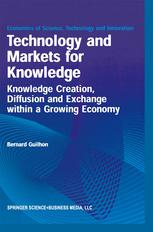

Most ebook files are in PDF format, so you can easily read them using various software such as Foxit Reader or directly on the Google Chrome browser.
Some ebook files are released by publishers in other formats such as .awz, .mobi, .epub, .fb2, etc. You may need to install specific software to read these formats on mobile/PC, such as Calibre.
Please read the tutorial at this link: https://ebookbell.com/faq
We offer FREE conversion to the popular formats you request; however, this may take some time. Therefore, right after payment, please email us, and we will try to provide the service as quickly as possible.
For some exceptional file formats or broken links (if any), please refrain from opening any disputes. Instead, email us first, and we will try to assist within a maximum of 6 hours.
EbookBell Team

4.4
92 reviewsThis book provides a unique set of empirical and theoretical analyses on the conditions, determinants and effects of the exchange and trade of technological knowledge. This work delivered by the research team lead by Bernard Guilhon shows that technological knowledge is more and more traded and exchanged in the market place. When and where contractual interactions are implemented by an institutional set-up which makes_the exchange better reliable for both parties. The new evidence provided by the book moreover makes it possible to appreciate the positive role of major knowledge rent externalities provided by the new quasi-markets for technological knowledge. Trade in technological knowledge leads in fact, as the book shows, to higher levels of division of labor, specialization and efficiency in the production and distribution of new technological knowledge. This dynamics is considered a part of a broader process where the generation of technological knowledge is itself becoming closer to the production of goods so that the division of labour among learning organization plays a growing role. Exchange of technological knowledge takes part because the conditions for appropriability are now far better that currently assumed by a large traditional literature. The analysis carried out through the book builds upon the notion of localized technological knowledge and suggests that the exchange of technological knowledge is not a spontaneous 'atmospheric' process.